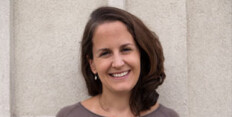"The real voyage of discovery consists not in seeking new landscapes but in having new eyes."
- Marcel Proust
About Lynn

“…painful moments in our lives…can be the seeds of…strength and wisdom if we take the time, effort and risk to fully realize the source of our suffering and are willing to face it directly.” Robert Wicks
I am a Licensed Clinical Professional Counselor with a Master of Science in Counseling from Loyola University in Maryland. I have been in private practice for over twenty years and have experience working with adults and adolescents, addressing a variety of issues: anxiety, depression, relationship problems, past or current trauma, eating disorders, self-mutilation, bereavement, parenting concerns, boundaries, and self-care.
When clients first come to see me, many mention previous negative experiences with psychotherapy. Complaints often are about therapists being “unresponsive,” “too clinical,” or even “silent.” People come looking for a connection—a relationship in which they can feel safe to be vulnerable, to speak difficult truth, to reveal pain, and to find possibilities. I believe that this solid connection between therapist and client is a prerequisite for significant healing and growth in any therapy process.
My professional commitments include: ongoing development of my clinical skills and competence; openness to regular feedback from clients about what they need and how they experience me so that we can maintain a strong therapeutic alliance; efforts to examine myself honestly and to address my own healing so that my needs will not interfere with my clients’ best interest; respect for all individuals and refusal to discriminate based on race, ethnicity, gender identity, spiritual/religious affiliation, or sexual orientation.
I live in Towson, Maryland with my daughters and Golden Doodle pup, Chase. Chase often joins me at work and loves to lie on or near clients’ feet.
Resources I Recommend
Books and other tools can be very helpful in supplementing the work you are doing in therapy. Here are some that I find valuable.
Daring Greatly: How the Courage to Be Vulnerable Transforms the Way We Live, Love, Parent, and Lead
This best-selling book is an easy and compelling read. The author, while researching happiness, discovered to her own chagrin that happy people are vulnerable people; she was personally challenged by her findings, and entered therapy to address her own love of control and difficulty being vulnerable. So much of what happens in a good therapy process depends on a client’s willingness to take risks and to be vulnerable. I often say that if people could take these risks in their personal relationships, and if those to whom they reveal themselves could be truly safe, open, and present, then I would be out of a job.
Self-Compassion: The Proven Power of Being Kind to Yourself
I’ve come to believe that so much of the distress we experience in life is due to self-judgment. We may not even realize how often we’re criticizing, berating, and rejecting ourselves in ways we would never treat those we love. Kristen Neff writes about a way of being with ourselves that can bring freedom and healing.
Maybe You Should Talk To Someone: A Therapist, HER Therapist, and Our Lives Revealed
This award-winning book is an excellent read. Honest, candid, funny, and deeply probing, the author (herself a psychotherapist) explores her life and pain through therapy. Existential themes abound– what it means to be human, to struggle with profound loss, to choose a path and find meaning, and to connect with others along the way.
Attached: The New Science of Adult Attachment and How It Can Help You Find– and Keep– Love
There’s a lot of information on the internet about attachment these days. This book does a great job of describing the three main attachment styles– anxious, avoidant, and secure,– as well as their implications in intimate relationships. The hope is that all of us can move towards a more secure place with our partners– able to soothe ourselves and enjoy our separateness and able to be close and connected in meaningful ways. Self-tests are available.
The 5 Love Languages: The Secret to Love that Lasts
A well known couples guide for many years, this book is a quick and easy read, based on the premise that we tend to show love in the way that we wish to receive it. The author describes five main “languages,”– physical touch, words of affirmation, quality time, acts of service, and gifts. Once we understand how we feel loved and how our partners feel loved, we can become more skilled and deliberate in our relationships.
The Body Keeps the Score: Brain, Mind, and Body in the Healing of Trauma
This author is the leading expert in the field of trauma, particularly in the ways that trauma affects the brain and body. I don’t recommend the book for everyone– it’s a behemoth, and includes a ton of information about neuroscience and complex trauma treatment. But many have found it very helpful and validating in their healing process, especially given the personal stories and experiences that make clinical concepts accessible. If you are addressing a significant trauma history and are finding that your fight/flight/freeze reactions are hijacking you regularly, talk therapy is not enough, and this book may help you find a way forward.
In Session: The Bond Between Women and Their Therapists
This book is the best I’ve read regarding the therapeutic relationship itself. Lott provides an in-depth exploration of the complexities of the bond that develops between therapist and client. She covers important topics such as boundaries, power, transference and countertransference, and the potential of the dynamic in the therapy room to shed light on clients’ relational patterns, hidden longings, traumas, and needs. Not only does she demonstrate the healing involved when a skilled and caring therapist provides safety and companionship in the midst of pain; she also thoroughly explores the damage that can occur when a therapist crosses boundaries and abuses power. If you are wanting to make sense of the intensity of your feelings for your therapist, or you are concerned about the appropriateness of your therapy experience and wish to discern what is best for you, read this book. Relevant for men, as well.
After the Affair: Healing the Pain and Rebuilding Trust When a Partner Has Been Unfaithful
I strongly recommend this book as a guide in facing and healing from the impact of an affair. Both partners will find a thorough and respectful discussion of the turmoil they may be experiencing. Abrahms Spring discusses unmet needs that may have contributed to a couple’s vulnerability to infidelity; possible maladaptive relational patterns that have sabotaged a couple’s potential for real intimacy; the ambivalence present in the daunting process of reconnecting, rebuilding trust, resuming sexual contact, etc. She holds out unswerving hope that healing is possible as difficult truths are faced, as risks are taken to become vulnerable again (not in the absence of solid efforts to regain trust), and as commitments are made, one step at a time. She goes so far as to say,– and I would agree,– that a relationship can become more intimate than ever before if both partners are willing to engage fully and honestly on a path of healing.
How to Talk So Kids Will Listen & Listen So Kids Will Talk
This book, although first published over three decades ago, has been very helpful to me in parenting my own children. The authors discuss ways to validate feelings, to set limits, and to teach conflict resolution. Examples of parent-child scenarios abound. Their book, Siblings Without Rivalry, also is helpful.
The Courage to Heal: A Guide for Women Survivors of Childhood Sexual Abuse
This is the most comprehensive guide I have found on the topic of sexual abuse. I do not recommend working through this content alone; please contact a professional if you are suffering from and are attempting to address the impact of sexual abuse in your childhood. The authors also have written several companion books. In particular, I recommend Allies in Healing as a validating and encouraging resource for partners of women who have been sexually abused.
Cutting: Understanding and Overcoming Self-Mutilation
This topic is overwhelming for and greatly misunderstood by many people. Levenkron helps readers to grasp that self-mutilation ultimately is a mechanism for coping. His focus in therapy is on establishing safe connection (“attachment”) with clients, giving them room to articulate what their self-harming behavior means to them (a way to feel alive when most of the time they are numb…a way to manage intense emotions which seem to engulf them…an act they can control in an atmosphere where they feel controlled by others…an act of rage and revenge…an attempt to tell their “story” in a silent language written on their bodies…). When clients feel respected, when they are given the message not only that they matter but also that they “make sense,” they often find the courage to break out of isolation. Once the unique purposes of self-mutilation are understood, those who suffer can begin to meet their needs in other ways. Levenkron carries us through the journeys of several people who courageously face their pain and who find healing and new life. I recommend this book for those who struggle with self-mutilation, for frightened parents and friends of those who struggle, for mental health professionals and physicians, and for educators.
Girls Like Us: Fighting for a World Where Girls Are Not for Sale: A Memoir
Lloyd has written a deeply moving memoir about domestic human sex trafficking, a subject about which many Americans are largely unaware. Her openness about her own traumatic history and process of healing, as well as her insights into the emotional/psychological and systemic factors that fuel this horrifying industry, are beautifully expressed. As an activist, Lloyd established and currently runs an organization in New York City called GEMS, “Girls Educational and Mentoring Services.” I recommend this book for those who wish to learn more or to become involved, as well as for those healing from sexual trauma.
Raising Cain: Protecting the Emotional Life of Boys
Parents and teachers will find this book very helpful in exploring cultural and social pressures on boys. If you would like to help your son to develop a strong sense of self, an active inner life, and an understanding of emotions, in the midst of a culture that often tries to shut down these things, you will find guidance here. Some topics include: peer relationships, mother-son and father-son dynamics, discipline, and sexuality.
Getting the Love You Want: A Guide for Couples
Hendrix is well-known in the field of couples therapy. His books are based on the idea that we are drawn unconsciously to partners who repeat the dynamics of our childhoods. He believes that, through the creation of a truly safe atmosphere and the mutual exploration of the origins of repetitive patterns that exist in a relationship, both partners can begin to replace constant wounding with healing. The content of these books and the personal exercises they include can require emotional and triggering work. But if you and your partner are willing to invest in the process, you will gain much insight and will have tools with which to bring healing and deeper intimacy into your relationship.
The Ungame is an easy tool for deepening knowledge and understanding in intimate relationships and among family members. There are several versions of this “game,” in which players take turns asking each other questions from cards. In this family version, one stack of cards focuses on lighter topics, the other asks about deeper feelings and experiences. The Ungame can be used as a therapy tool, as well.





